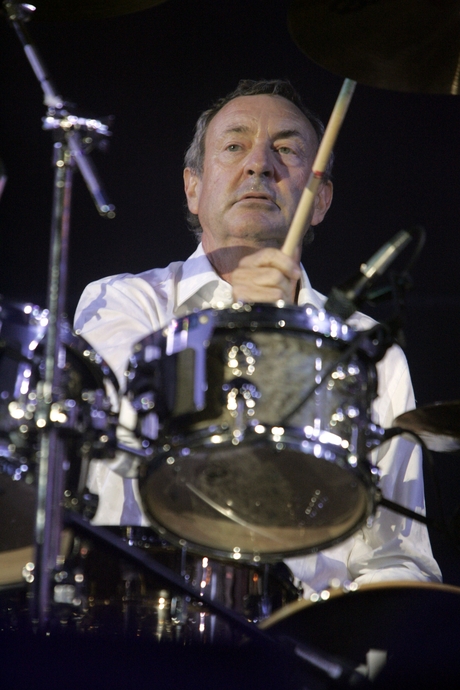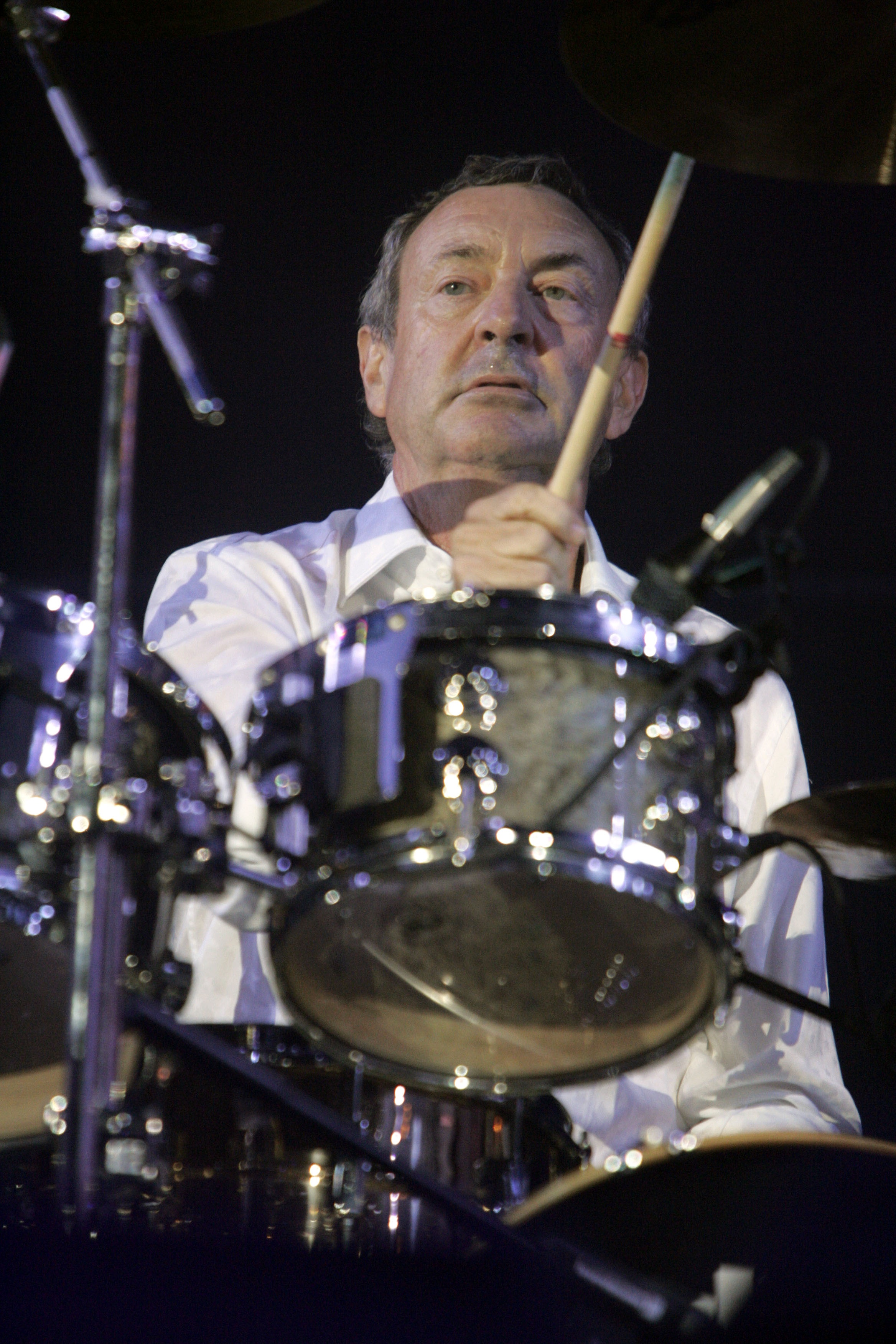Drum Icon Interviews: Nick Mason
The Pink Floyd man talks drum lessons, moustaches and the forthcoming Pink Floyd Anthology

Want all the hottest music and gear news, reviews, deals, features and more, direct to your inbox? Sign up here.
You are now subscribed
Your newsletter sign-up was successful

© Hubert Boesl/dpa/Corbis
What have been some of your greatest achievements as a drummer?
"Pink Floyd and the success of the band is the most important thing. With something like the motor racing, however successful, it's an indulgence. The great thing about the band is how seriously people take it and that is personally very rewarding. One couldn't say it's a gold record or an award as such, it's that sense that you've given a lot of people something that's quite important to them, and that's really quite powerful. I really began to understand that more clearly after I'd done the book [Inside Out: A Personal History of Pink Floyd] and I'd been on signing tours, because it's much more individual. People want the book dedicated to them, they talk to you. Particularly in Eastern Europe where rock'n'roll wasn't quite as easy as it was over here. It wasn't a matter of your parents saying, 'You call that music, it's rubbish,' - people actually suffered for it. You come away from that sort of thing a little more humbled and conscious of how important it was."
You've been working on a film about the Pink Floyd. Searching through the archives, has that stirred any feelings in you?
"Oh yes, there's lots of good stuff. Doing the book I've been through a lot of photographs. Some of them are very funny, seeing just how bad the moustache was and how big the flares were."
Pardon the pun, but what drives you as a drummer?
"This comes back to a quote I made in Rhythm. It's a funny half-world. The technique and, almost, the gymnastics is really something that tends to only be appreciated by other drummers because, actually, the job at the end of the day tends to be to integrate with the band and make that sound. One gets into some very interesting stuff about how people play and what they put into it. The comparisons between Ginger Baker and Ringo Starr. Actually Ginger wouldn't have been the best person for The Beatles. There is this thing about sensitivity to the music that is so important. This gets forgotten with the drum clinics. The answer is that I've always enjoyed the thing of playing in a band, not playing on my own. For me the real excitement is that moment when the bass player plays, you set something out and the other musicians join in."
"I've always enjoyed the thing of playing in a band, not playing on my own"
If you could teach your younger self one lesson what would it be?
"Easy, I'd take lessons. I've never had a lesson and I regret it. I think it's too late, it would be so difficult to reveal to anyone just how poor my technique is! There is absolutely no doubt that my recommendation to anyone is to get lessons. There's an interesting thing with formal training. In classical music it will drive out the ability to improvise. I think Gary Wallace once said, it's like learning to read. If you can't read you can't read the books. It's really good to get that grounding. My personal feeling is to listen to what everyone else is doing also."
How do you think the drum industry has changed?
"The most interesting thing is how drummers have clearly become more Neanderthal. When you look at an old drum kit the flimsiness of the whole thing is appalling. Most of us would feel uneasy even tapping the thing. What's interesting is the way the fittings have become so much stronger and more robust. I don't think people are playing harder than they did 25 years ago, but they are much more practical now. They last longer. There isn't that thing of every kit seems to have some bit of extra metalwork to hold something on or tape around the wingnut. I love the thing of custom drums, and the DW concepts. I started with Premier, then was immediately seduced by Ludwig after seeing Ginger Baker, had a brief flirtation with Fibes, then went back to Ludwig. Bill Ludwig's still a good friend of mine, I loved that whole drummer club thing that came with it. When Ludwig changed hands in the '80s I went to DW. They are the next development with the tuning of the shells and the sort of detail and experimentation that I like. They work within a very confined space. How many things can you do with a snare drum? There's a drum that I really like [the Edgevent model]. It's vented all the way round and you can open and close the vents, which I think is a great development.
"I also like the Richie ring. It's a much neater solution to damping a drum. How many kits have you seen where you see a perfectly good drum kit and then it's covered in gaffer tape and jelly! I really like them. There's something distressing about a beautiful kit with stuff hanging off it.
Want all the hottest music and gear news, reviews, deals, features and more, direct to your inbox? Sign up here.
"Then there's the electronic drum kit. From the days of the Simmons, I had one of the original things, it was just as mind-boggling. The modern kits are fantastic. I'm surprised we haven't seen more of them out and about."
Who are some of your personal drum icons?
"Most of my icons are the people that were my heroes when I was kicking off. I wouldn't be here today if it wasn't for Ginger Baker. When the curtain opened at the Regent Street Polytechnic in 1966 and there was Ginger, Eric and Jack I thought, that's what I'd like to be, and that was it. In terms of style and rock drummers I like, it was Mitch Mitchell. Whether it's behind the beat or not, it's so lazy, but it worked perfectly under Jimi and that slightly jazzy thing. There's no one else like him. Keith Moon, of course. John Bonham was almost a fraction too late for me to be quite so influential. I love all the be-bop drummers too. People like Chico Hamilton."
What do you have in the pipeline for the coming year?
"There's two things. We've been developing the idea of a Pink Floyd anthology for a long time. I've spent quite a lot of time trying to find the material. I really enjoy that, but it's time consuming. We're talking about doing a big reissue of the Pink Floyd catalogue because there is the belief that there eventually will be the point that there simply won't be enough market to generate those sort of packages. That would be a tragedy, so it's a good time to do it. I've been working down at the Roundhouse. The whole basement is given over to studios for local kids to come in and hopefully develop their talents. EMI gave us a lot of the old equipment out of Abbey Road. There's a recording studio as well as rehearsal rooms. I think the music industry is difficult now. Although there are opportunities there are fewer and fewer opportunities to make any money at it. It would be very nice to give kids the opportunity to make a go of it."
The 25th anniversary issue of Rhythm is on sale now.
I'm MusicRadar's eCommerce Editor. In addition to testing the latest music gear, with a particular focus on electronic drums, it's my job to manage the 300+ buyer's guides on MusicRadar and help musicians find the right gear for them at the best prices. I dabble with guitar, but my main instrument is the drums, which I have been playing for 24 years. I've been a part of the music gear industry for 20 years, including 7 years as Editor of the UK's best-selling drum magazine Rhythm, and 5 years as a freelance music writer, during which time I worked with the world's biggest instrument brands including Roland, Boss, Laney and Natal.
